Resposta para a especialidade de Sementes
1
2
Then God said, "I give you every seed-bearing plant on the face of the whole earth and every tree that has fruit with seed in it. They will be yours for food. Genesis 1:29
3
4
5
This list does not include the dozens of seeds used as spices or oil (see below), nor does it include seeds which are incidentally eaten as part of a fruit (strawberry, banana). However, you should accept such answers if they are given.
- Almond
- Barley
- Brazil nut
- Cashew
- Chestnut
- Chickpea (garbanzo)
- Cocoa
- Coconut
- Corn
- Cowpea
- Filbert
- Green bean
- Lentil
- Lima bean
- Macadamia
- Millet
- Mustard
- Navy bean
- Oat
- Pea
- Peanut
- Pecan
- Pine nut
- Pinto bean
- Pistachio
- Pomegranate
- Pumpkin
- Rice
- Rye
- Sesame
- Soybean
- Sunflower
- Walnut
- Wheat
- White bean
6
- Coconut
- Corn
- Cottonseed
- Canola oil (a variety of rapeseed oil)
- Olive
- Palm
- Peanut
- Safflower
- Sesame
- Soybean
- Sunflower
- Rice Bran
7
- Anise
- Caraway
- Cardamom
- Cocoa
- Coriander
- Cumin
- Dill
- Fennel
- Nutmeg
- Mustard
- Vanilla
8
Requirements for seed germination
Seed germination depends on many factors, both internal and external. The most important external factors include: water, oxygen, temperature, and the correct soil conditions. Every variety of seed requires a different set of variables for successful germination. This depends greatly on the individual seed variety and is closely linked to the ecological conditions in the plants' natural habitat.
Seeds must be mature and environmental factors must be favorable before germination can take place. When a mature seed is placed under favorable conditions and fails to germinate, it is said to be dormant. Some seeds will not germinate (begin to grow) until they have been dormant for a while. The length of time plant seeds remain dormant can be reduced or eliminated by a simple seed treatment called stratification. Seeds should be planted promptly after stratification.
Stratification mimics natural processes that weaken the seed coat before germination. In nature, some seeds require particular conditions to germinate, such as the heat of a fire (e.g., many Australian native plants), or soaking in a body of water for a long period of time. Others have to be passed through an animal's digestive tract to weaken the seed coat and enable germination.
9
References
- Wikipedia articles




